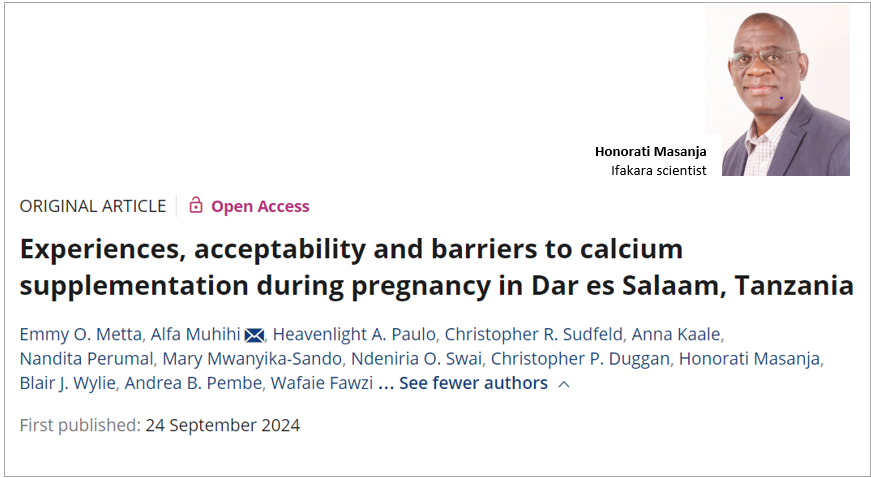
MATERNAL HEALTH: Scientists recommend reducing calcium supplement dosage for pregnant women

A recent study conducted in Tanzania has found that while pregnant women are willing to take calcium supplements, concerns such as pill size and the need to adhere to three doses per day pose a challenge, making it harder for them to follow the recommended regimen.
To tackle the challenge, scientists recommend addressing these barriers by scaling up calcium supplementation programs and reducing daily doses to improve maternal health outcomes. The scientists, which include experts from Muhimbili University of Health and Allied Science (MUHAS), Africa Academy for Public Health (AAPH), Harvard T.H. Chan School of Public Health, Ifakara Health Institute, and Columbia University Medical Center, shared these insights in a study published on the Maternal & Nutrition journal.
“Scaling up calcium supplementation in pregnancy should build on the existing acceptability and adherence data. Reducing the number of calcium supplement doses per day may reduce implementation costs, improve adherence and consequently lead to greater impact,” the scientists stated.
Significant barriers impacting adherence
This study is the first in Tanzania to explore the acceptability of calcium supplementation during pregnancy from the perspectives of both women and healthcare providers, with participants recruited from two public health facilities in Dar es Salaam.
Participants identified barriers such as the large size of the pills and the challenge of taking three doses daily, in addition to other supplements like iron and folic acid. Most women reported difficulties in swallowing the pills, with some opting to crush, chew, or dissolve them in liquids.
Positive attitudes despite challenges
Despite these challenges, the women expressed positive attitudes toward calcium supplements, driven by their belief in the health benefits for both themselves and their babies. The scientists noted that this perception of benefit was crucial in motivating women to continue taking the supplements.
“Participants expressed the acceptability of using calcium supplements during pregnancy, but adherence to three doses per day posed challenges to pregnant women. Reducing the number of calcium supplement doses per day may improve adherence,” they noted.
Integrating supplements into antenatal care
The study also indicated that integrating calcium supplementation into routine antenatal care could be an effective solution, enabling women to access the supplements without incurring additional visits or costs. However, many participants and healthcare providers expressed concerns about the high number of supplements women are expected to take throughout pregnancy. The scientists recommend exploring ways to combine calcium with other essential nutrients, like iron and folic acid, to lessen the pill burden.
Single low-dose supplement as a solution
Citing one of their studies, the scientists noted that a single low-dose calcium supplement (500 mg/day) could effectively reduce the pill burden on pregnant women. They highlighted that this lower dose could be as effective as the current higher dose (1500 mg/day) in preventing pre-eclampsia.
“Recent publications of two clinical trials by our group demonstrated that a single low-dose calcium supplement (500 mg/day) is as effective as the WHO-recommended high-dose regimen (1500 mg/day) in reducing the risk of pre-eclampsia in India and Tanzania.”
“These findings address the concerns of pregnant participants and healthcare providers regarding the reduction of doses without compromising health benefits. If adopted, a single low-dose calcium supplementation would ease the pill burden on pregnant women.”
Recommendations for improved adherence
In conclusion, the scientists recommend that reducing the pill burden associated with calcium supplements during pregnancy may lower program costs, improve adherence, and maximize the intervention's potential benefits. The expansion of antenatal calcium supplementation should be based on existing acceptability and adherence data.
Ifakara scientists contribute to the study
Scientists from Ifakara Health Institute, Anna Kaale and Honorati Masanja, contributed to the study, which was led by Emmy Metta and Alfa Muhihi, the co-first authors from Muhimbili University of Health and Allied Sciences (MUHAS).
Other contributors included experts from the Africa Academy for Public Health (AAPH), Harvard T.H. Chan School of Public Health, and Columbia University Medical Center.
Read the publication here.
